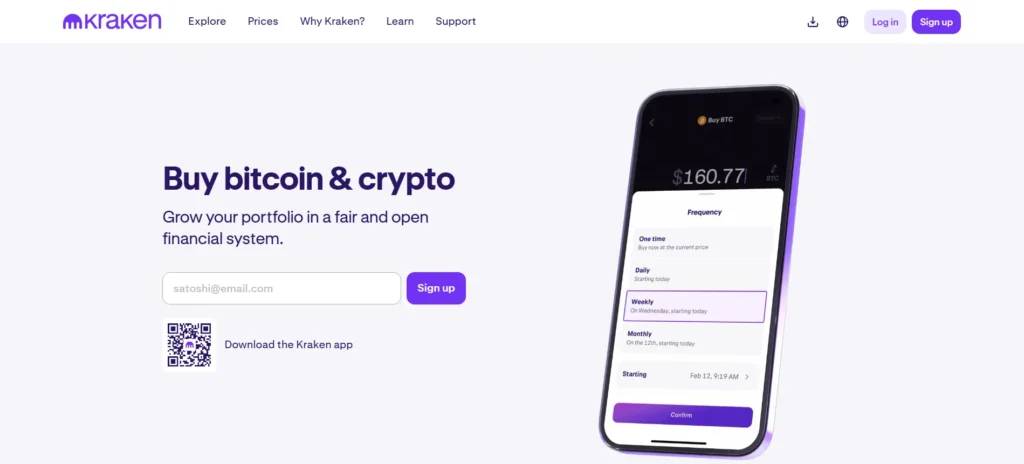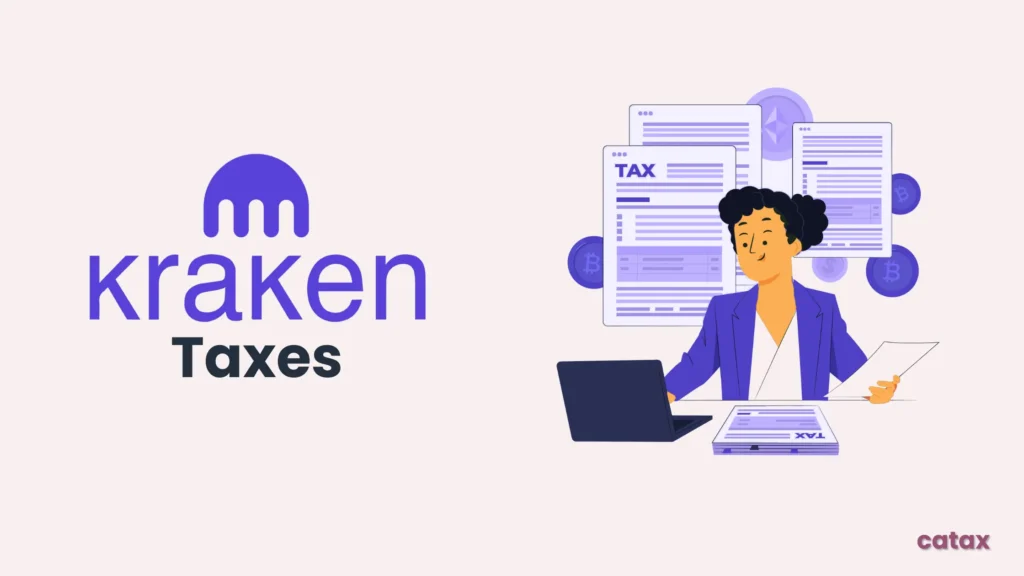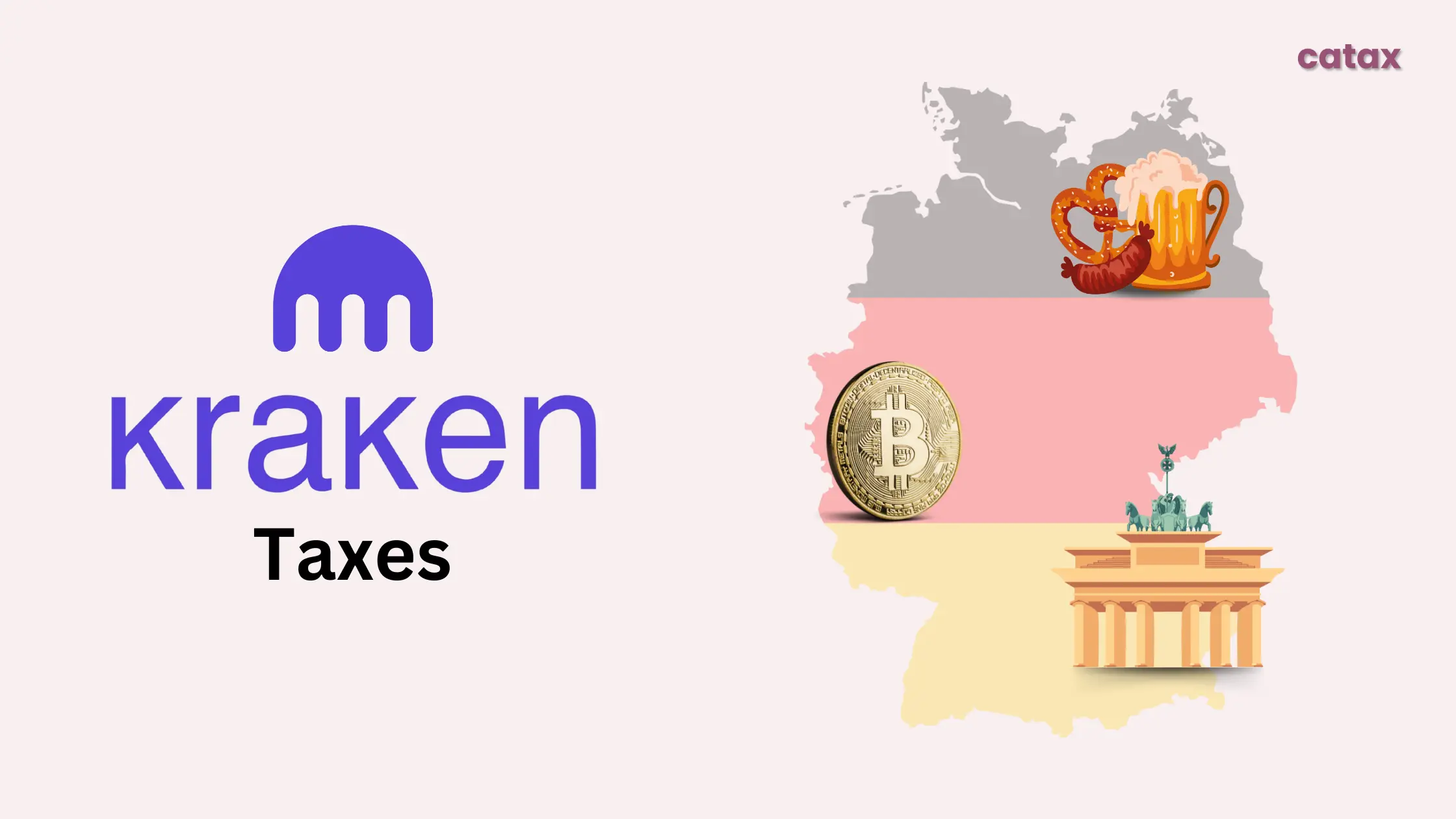This guide helps you understand and calculate Kraken taxes in Germany. It provides clear and simple instructions, making the process easy to follow and accurate.

- How Can Catax Assist You with Your Kraken Tax in Germany?
- Do Germany Kraken Users Receive Tax Reports from Kraken to Germany’s Federal Central Tax Office (BZSt)?
- How Does the BZSt Use the Information Received from Kraken?
- Is It Possible for the BZSt to Track Cryptocurrency Transactions?
- What Do I Owe for Using Kraken Tax in Germany?
- Simplify Your Kraken Tax Reporting with Catax
- Understanding Capital Gains Tax on Cryptocurrency in Germany
- German Income Tax Brackets for 2025
- Is There Any Way to Reduce My Kraken Crypto Tax?
- Why Filing Your Kraken Crypto Taxes in Germany Is Crucial?
- Some basic tips for investor
- How Catax helps you to calculate your Kraken Taxes?
How Can Catax Assist You with Your Kraken Tax in Germany?
Understanding Germany’s cryptocurrency tax rules can be challenging, especially as crypto becomes more popular for investments and transactions. Thankfully, more accounting experts now offer specialized services for crypto taxes, making it easier to get the right guidance. If you’re using Kraken in Germany, working with these professionals can help you manage your taxes smoothly and avoid costly mistakes.
Catax emerges as a robust companion in this realm, offering reliable cryptocurrency tax reporting services specifically tailored for German taxpayers. Catax simplifies the process of tracking your profits and losses, accurately converting your cryptocurrency transactions into their Euro equivalents with precision.
- Utilizing Catax for Simplified Tax Reporting
Catax ensures a seamless synchronization process. By linking your Kraken account with Catax, the platform securely accesses your trading records, simplifying the calculation of your crypto taxes efficiently. - Guide on Account Synchronization: Follow a structured guide detailing steps to sync your Kraken account with Catax for accurate tax reports.
- Recommendation for Tax Calculation: Kraken users can also explore Germany’s complimentary crypto tax calculator to estimate tax liabilities based on trading profits.
Do Germany Kraken Users Receive Tax Reports from Kraken to Germany’s Federal Central Tax Office (BZSt)?
German Kraken users do not directly receive tax reports from Kraken to the German Federal Central Tax Office (BZSt).
Kraken complies with KYC regulations by collecting user data but is not obligated to automatically share it with tax authorities like the BZSt. However, this does not exempt users from reporting their crypto transactions in Germany. Here’s what you need to know:
- Crypto gains are taxable in Germany: If you make profits from selling crypto, earn staking rewards exceeding €2,500 per year, receive airdrops categorized as income, or use crypto for purchases, you must report them on your tax return.
- The burden of proof lies with you: The German tax office (Finanzamt) may request transaction data from Kraken if they suspect tax evasion. However, it remains your responsibility to maintain accurate records and report taxable crypto activities.
- Kraken offers tax tools: Kraken provides a “Tax Tool” that allows users to download transaction history and calculate gains/losses. This data can be used for manual reporting or linked to third-party tax software for streamlined filing.
Tax laws can change, so consulting a professional tax advisor familiar with cryptocurrency taxation is highly recommended to ensure compliance and avoid penalties.
How Does the BZSt Use the Information Received from Kraken?
The BZSt in Germany likely uses Kraken data to enforce tax regulations, particularly regarding capital gains on cryptocurrency transactions. While specific details are not publicly disclosed, this aligns with the global trend of tax authorities focusing on digital assets. Users should stay updated on BZSt announcements and consult tax professionals for the latest cryptocurrency tax regulations in Germany.
Is It Possible for the BZSt to Track Cryptocurrency Transactions?
The BZSt and regulatory bodies use various mechanisms to monitor cryptocurrency transactions, ensuring compliance with tax laws and anti-money laundering regulations. Through the Crypto Asset Transfer Ordinance, which implements the FATF’s Travel Rule, Germany mandates crypto service providers to ensure transaction traceability. Additionally, Germany has detailed guidelines for the taxation of different crypto activities, including trading, mining, and earning cryptocurrency as income.
What Do I Owe for Using Kraken Tax in Germany?
In Germany, using Kraken for cryptocurrency trading may result in capital gains tax on any profits earned. The tax rate and treatment depend on factors such as:
- Holding period
- Trading frequency
- Individual tax circumstances
Cryptocurrency traders must report their transactions in their annual tax declarations and may face penalties for non-compliance. Seeking advice from a tax professional familiar with cryptocurrency taxation is recommended for compliance with German tax laws.
Simplify Your Kraken Tax Reporting with Catax
Looking to streamline your cryptocurrency tax reporting in Germany? Catax offers a seamless solution. By importing your Kraken transactions effortlessly, Catax generates comprehensive reports integrating gains, losses, and tax obligations.
Beyond Kraken, Catax supports multiple wallets, blockchains, and exchanges, ensuring automated tax reporting. Start simplifying your tax process with Catax’s complimentary preview report today!
for more details visit here: How to Calculate Kraken Taxes?
Understanding Capital Gains Tax on Cryptocurrency in Germany
Cryptocurrency transactions in Germany are subject to capital gains tax, which varies based on the holding period and trading frequency. The table below outlines the tax rates for different scenarios:
| Holding Period | Tax Rate |
|---|---|
| Less than 1 year | Individual income tax rates (up to 45%) |
| More than 1 year | Exempt up to €600 in gains per year; after that, 0-25% depending on total income |
Frequent traders may be subject to higher tax rates as their gains might be classified as business income. All crypto transactions must be reported in annual tax declarations, including details of gains, losses, and trading activity. Consulting a tax professional ensures compliance with German tax laws and helps optimize tax liabilities.
German Income Tax Brackets for 2025
In Germany, all individuals who are residents are taxed on their worldwide income. This means that no matter where the income is earned, it falls under German tax regulations. However, non-residents are only taxed on income that is sourced within Germany.
For crypto investors, Germany follows a progressive income tax system, which means that the more you earn, the higher your tax rate. Short-term crypto gains—profits made from selling cryptocurrency within one year of buying it—are subject to these tax brackets. But if the crypto is held for more than one year, it becomes completely tax-free, making long-term holding a major tax advantage.
| Germany Tax Rate | Taxable Income Range for Single Taxpayers (EUR) | Taxable Income Range for Married Taxpayers (EUR) |
|---|---|---|
| 0% | Less than 10,908 | Less than 21,816 |
| 14% – 42%* | 10,908 – 62,809 | 21,816 – 125,618 |
| 42% | 62,809 – 277,825 | 125,618 – 555,650 |
| 45% | 277,825 and greater | 555,650 and greater |
Is There Any Way to Reduce My Kraken Crypto Tax?
In Germany, there are legal strategies to reduce your crypto tax liability:
- Hold Crypto Longer: Crypto held for more than a year is tax-free upon sale.
- Use Tax-free Limits: No tax on the first €600 of profit from crypto sales or the first €256 from mining/staking if below these amounts.
- Report Losses: Selling at a loss can offset taxable gains.
- Gift Crypto: Crypto can be gifted tax-free to family or a spouse up to a significant limit.
- Move to a Tax-friendly Country: Some countries have lower or no crypto taxes, though relocation is a big step.
- Use Crypto Tax Software: Tools like Catax can calculate taxes automatically and help identify potential savings.
Always ensure compliance with legal regulations and consider professional tax advice for accurate reporting.
FIFO Crypto Tax Germany Example
You purchase 1 Bitcoin (BTC) for €18,000. After six months, you buy another 1 BTC for €22,000. Six months later, you decide to sell 1 BTC for €32,000.
Under the FIFO (First-In, First-Out) method, the first Bitcoin you purchased is considered the one you sold. Since you held this first Bitcoin for over a year, the sale is tax-free according to Germany’s crypto tax rules.
Three months later, you sell your second Bitcoin for €36,000. This Bitcoin was held for only nine months, so it does not qualify for the 1-year tax exemption. The profit from this sale is:
€36,000 (Sale Price) – €22,000 (Purchase Price) = €14,000 This €14,000 gain is subject to income tax in Germany.
Why Filing Your Kraken Crypto Taxes in Germany Is Crucial?
In Germany, failing to file taxes on cryptocurrency transactions can have significant consequences. As a result, crypto assets are subject to various tax regulations. Furthermore, these regulations are based on the nature of the transaction and the period of holding. Consequently, here’s a general overview of how cryptocurrency transactions are taxed and the potential repercussions of non-compliance:
Taxation of Cryptocurrency Transactions
- Short-term vs. Long-term Holdings: Crypto assets held for over a year are not taxable upon sale, making long-term investments tax-free. Gains from the sale of crypto assets held for less than a year are subject to income tax, with the rate depending on your income tax bracket.
- Mining, Staking, and Lending: Income from mining, staking, or lending crypto is subject to income tax, less any applicable expenses. Mining operations may be considered commercial activities, leading to potential business tax liabilities.
- Crypto Used for Purchases: Spending crypto on goods and services within a year of acquisition is taxable, with gains treated as income. Holding the crypto for over a year before spending exempts these transactions from tax.
- Thresholds and Exemptions: Small gains from crypto trading (up to €600) within a year may be exempt from taxation. Gifting crypto to friends or family is tax-free up to certain limits.
By following these tips and leveraging tools like Catax, investors can navigate the complexities of crypto taxation in Germany more effectively.
Some basic tips for investor
- Understand Tax Obligations: Familiarize yourself with Germany’s crypto tax regulations, including reporting requirements and tax rates.
- Keep Detailed Records: Maintain accurate records of all crypto transactions on Kraken, including buys, sells, trades, and transfers.
- Use a Crypto Tax Calculator: Utilize tools like Catax, a crypto tax calculator, to simplify the process of calculating and reporting your crypto taxes accurately.
- Consider Holding Period: Long-term holdings (over a year) are tax-exempt upon sale, while short-term gains are subject to income tax.
- Be Aware of Thresholds: Pay attention to tax-exempt thresholds for capital gains and income, ensuring compliance with reporting requirements.
- Stay Informed: Stay updated on any changes to crypto tax regulations in Germany to ensure compliance and minimize tax liabilities.
By following these tips and leveraging resources like Catax, investors can navigate the complexities of crypto taxation in Germany more effectively.
How Catax helps you to calculate your Kraken Taxes?

- Log in, go to History > Export, select all transactions, and download the CSV.
- Log in to Catax, select Kraken, and upload your CSV file.
- Catax processes your data and generates a detailed tax report.


